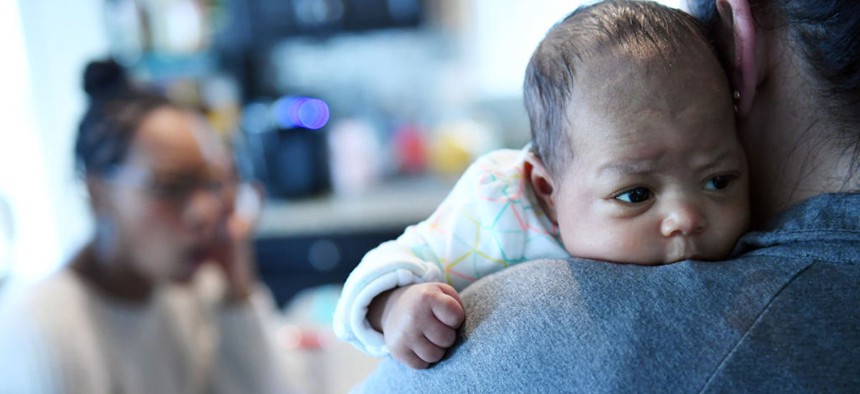States hope doulas can deliver better maternal health outcomes

Kassandra Johnson, left, talks to doula, Alyssa Seidorf, right, as she holds Kassandra's daughter in Lanham, Maryland, on March 4, 2019. Photo by Matt McClain/The Washington Post via Getty Images
Lawmakers are pouring resources into health care services like doula programs to improve comprehensive reproductive and maternal health care.
The U.S. is facing a maternal health crisis. With the number of women who die while giving birth steadily increasing in recent years, states are moving to provide more comprehensive and effective reproductive health care services for residents.
To improve health outcomes for new mothers and their babies, various states have recently passed or are considering legislation in support of labor doulas, or nonclinical professionals who are trained to offer educational resources and emotional and physical support during the labor and delivery process.
A doula’s primary goal is to ensure that clients feel as comfortable and safe as possible during their delivery and to advocate for the patient’s needs to doctors and nurses, said Barbara Christianson, a certified doula and public health nurse consultant at the Association of Women's Health, Obstetric and Neonatal Nurses. Doulas can help patients manage high stress caused by pregnancy complications or uncertainties about medical terminology and processes, for example, which could lead to high blood pressure, putting patients at risk of preeclampsia, preterm births and even death.
Maternal mortality rates in the U.S. nearly doubled from 17.4 per 100,000 live births in 2018 to 32.9 per 100,000 per live births in 2021, creating what officials call a national maternal health crisis. At the same time, infant mortality—or the death of an infant before their first birthday—saw a 3% increase in 2022 for the first time in two decades.
Doulas are not authorized to administer medication or perform clinical procedures, but they can advise patients on breathing or muscle relaxing exercises, for example, which could help reduce pain and the accompanying stress to improve labor or delivery, Christianson said. They also can help individuals navigate their roles and responsibilities as parents.
With health care systems strapped for staff, doulas offer supplemental care to the patient that doctors and nurses may not have the time for, Christianson said. Plus, doulas play an important role in patient advocacy. For instance, they work with patients to develop a birth plan—which could include the mother’s preference as to who is allowed in the delivery room while the baby is born or rearranging the hospital room furniture to make it easier for the mother to navigate—and make sure it is communicated to and executed by the health care team. Doulas are also responsible for protecting the patient’s safety and can even witness and report medical malpractice or mistreatment towards the mother.
A history of mistrust toward the medical field, especially for people of color who have historically faced health care discrimination, has motivated patients to push for better health care, Christianson said. “People are speaking up, sharing information, reading statistics and sharing each other’s stories … to try to protect [themselves],” she added.
Plus, with the overturning of Roe v. Wade, more women may be undergoing pregnancies that could pose a risk to their mental or physical wellbeing. Doulas are crucial in those circumstances, Christianson said, as they can help their clients navigate the health care system and help them be more comfortable with the process.
And states are taking note. At the start of 2024, for instance, Delaware and New York began requiring doula services to be covered by Medicaid in an effort to reduce and prevent further maternal and infant mortality deaths. New York’s law, which passed late last year, also called for the state health department to create and manage an online directory that individuals can use to find and contact certified doulas in the state.
“Our maternal and infant mortality rates are a disgrace,” New York Gov. Kathy Hochul said in a November statement. “Expanding access to doula services is an effective, evidence-based strategy to support expectant parents and allow their babies to grow and thrive.”
At least 10 states and the District of Columbia cover doulas under Medicaid, but only two—Louisiana and Rhode Island—require private insurance to do so as well.
In May, Tennessee approved legislation to establish a doula services advisory committee within the state’s Medicaid program that will develop standards for doulas and determine reimbursement rates for beneficiaries. In Pennsylvania, the state Department of Human Services is working with the nonprofit Pennsylvania Doula Commission to increase the number of licensed doulas by offering subsidies for the commission’s certification fee. And New Jersey passed a bill in November requiring hospitals and birthing centers to allow doulas to accompany mothers for childbirth and to inform health care providers and patients of the new rules.
Federal support has given states an opportunity to enact these programs, Christianson said. In June 2022, the Biden administration launched the White House Blueprint for Addressing Maternal Health, a whole-of-government program aimed at reducing maternal mortality through enhanced maternal care workforce training, expanded access to doulas and midwives and improved maternal health data, among other goals.
Last month, the Centers for Medicare and Medicaid Services expanded upon the blueprint by launching the Transforming Maternal Health Model, a funding opportunity for state Medicaid agencies aimed at improving maternal health for people enrolled in Medicaid and the Medicaid and Children's Health Insurance Program.






